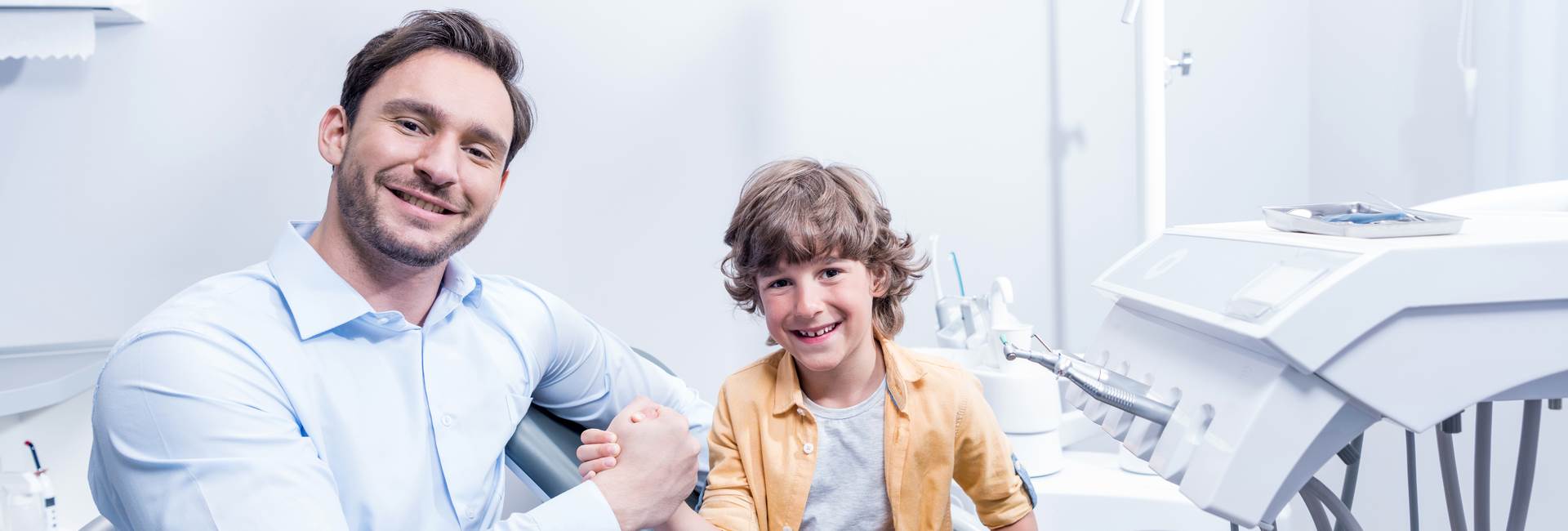Trusting your child’s teeth to a dentist means more than just cleanings and fillings. You’re also trusting your child’s future health to us, and that’s a big deal.
We do everything we can to make visits to the dentist positive, healthy, and fun for your child, and we want to partner with you to help them build good hygiene habits that will last for their entire lives.
Learn more about our approach to pediatric dentistry and how we can help!
What is pediatric dentistry?
Pediatric dentistry focuses on dental treatment for children. It ranges from teeth cleanings to treatment to fix the teeth, like fillings, stainless steel crowns, or baby teeth removal. A big emphasis is made on educating the patient and parents, and also, establishing healthy habits at home. Because the dental treatment involves baby teeth, different considerations are taken to ensure that there is enough space for the adult teeth to erupt and that they erupt in a clean oral environment.
Why do I need to fix my child’s “baby teeth” if they will eventually fall out?
Baby teeth can start erupting around 6 months of age and the last one will fall out around 12-13 years of age. During these years where your child will have their baby teeth, it will be very important to develop good habits and a good oral hygiene regimen that your child will continue into their adult years. Even so, cavities and other dental conditions may still develop. If a cavity were to form on a baby tooth, it may be years before that tooth is ready to be replaced by its adult successor. If no treatment is done, that cavity will grow until it reaches the pulp and nerve of that tooth, and it generally does so at a more rapid rate than in adult teeth. Once that cavity nears or enters the pulp of a tooth, pain, and infection will set it. At this point in time, the course of treatment to remedy the pain will likely be to remove the tooth. In addition to the dental pain the child will have experienced, if a baby tooth is removed prematurely, shifting of the adjacent teeth will occur during the time it takes for the adult tooth to naturally replace it. This causes loss of space for the adult tooth to erupt and results in crowding or crooked teeth as an adult. If a tooth with a cavity is fortunate to fall out on its own before dental pain or infection develops, there is still a risk of the bacteria from that cavity spreading to other teeth and more forming cavities.
When do kids start going to the dentist?
It is recommended by both Dr. Ava Khodakhast and the American Dental Association to have your child see a dentist within 6 months after having their first tooth erupt. At this age, kids will start familiarizing themselves with the dental office and we can start to answer any questions you, the parent, may have. Most babies will have their first tooth come in around 6 months of age.
What happens during a child’s first dental appointment?
We feel that it is crucial that a child’s first dental appointment goes well in order to build trust. For this reason, we only do as much as the child feels comfortable allowing us to do. Depending on the age and size of the child, some children remain in the laps of their parent during the examination. We slowly introduce the child to the instruments we use and allow them to touch them so that they are not fearful. If the child is cooperative, we will proceed with taking radiographs of their teeth, if appropriate, and to clean their teeth.
My child gets very nervous at the dentist office. Do I need to see a “kids only” dentist?
For those that have some anxiety at the office, we offer nitrous, or laughing gas, to our patients to help make them feel relaxed and comfortable during their appointment. For most of our patients, nitrous is a wonderful tool to help them complete their treatment. Although Dr. Khoda is very comfortable and capable of treating the dental needs of kids, there may be situations where she will recommend the patient to see a pediatric dentist based on the complexity of the child’s needs.
Why choose Argyle Family Dental as your pediatric dentist?
Dr. Khoda understands the needs of each child are different. She helps her younger patients feel comfortable and achieve a healthy and beautiful smile. She focuses on oral and whole-body health, reviewing all recommendations, and forming a long term plan with each child’s parents. The health of your child’s teeth is very important as they have many years ahead of them. You are in charge of choosing your path!
How do I brush my child’s teeth?
Since every child is different in their level of cooperativity, there is no exact science on how to brush your child’s teeth. Dr. Khoda has found that making it fun for the child makes it easier for the parent to get in the child’s mouth long enough to brush all the surfaces of their teeth. Most children who still have all their baby teeth, have small spaces between their baby teeth, and brushing alone should be enough to get all the surfaces clean. If you can see that your child’s teeth are touching, flossing occasionally would be beneficial.
Contact us today if you have any questions or would like to schedule an appointment.



